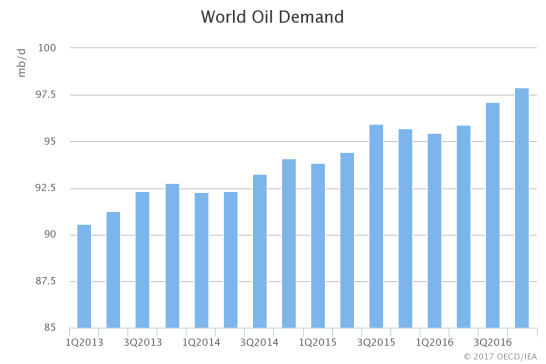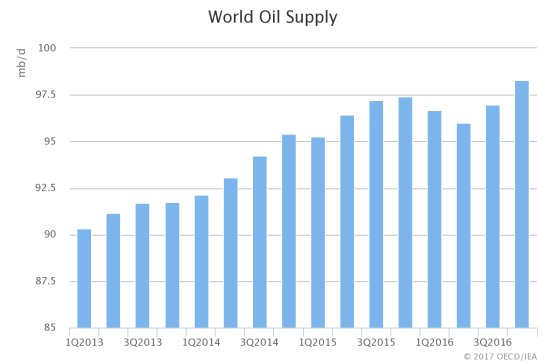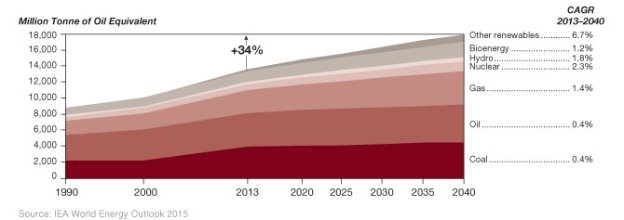The article reveals the role of oil and gas marketing strategy in business. The approach to the functional strategy of developing in accordance with modern environmental requirements and market conditions. A detailed information in this work is also consist of supply and demand world statistics of oil and gas industry, forecasts and recommendations for the near future of oil and gas business.
Keywords: marketing, oil and gas business, market conditions, world oil demand, world oil supply, trends
Today it's well known that the oil and gas sector is in a period of transformation. The energy business can be radically changed due to the recent events. That is why, at nearest future, decisive actions from the leaders of oil companies that will allow the business not only to survive in the short run, but also prepare the corporation for future changes.
As a result of glut, over the past few years, an excess supply of 1.5-2 million barrels per day occurred in the energy market [1].
The agreement on the freezing of oil production, adopted in February, 2016, will eventually equalize this imbalance. In terms of demand and supply, presented in graphics 1 and 2, it is evident that in the third quarter of 2015 the supply exceeded demand by about 2 million barrels per day [1]. According to forecasts, it is believed that at least in the next year the equilibrium supply and demand will not be reached.
However, competition, declining prices and excess supply are not the only factors affecting oil and gas companies. The world community is increasingly thinking about environmental issues.

Fig. 1. World oil consumption, 2016

Fig. 2. World oil supply
In 2015, at the twenty-first summit of the United Nations Framework Convention on Climate Change in Paris, an agreement was adopted to maintain an increase in the average temperature of the planet: below 2 ° C for the reduction in greenhouse gas emissions.
Nevertheless, this decision does not call into question the existence of oil-producing and oil-refining companies, but their operating procedure will be precisely subjected to changes. According to many analysts, the "oil era" is coming to an end, and, presumably, biofuel, nuclear power, and renewable energy will soon begin to occupy an increasing share of the energy business (graphic 3). Thus, in the emerging conditions for the oil and gas industry, it is necessary to revise its strategies.

Fig. 3. World primary demand for fuel, forecast to 2040
PwC — an international consulting and auditing network for companies. After making analysis of oil and gas market trends for 2016, offered the leaders of oil and gas companies the following steps of the marketing strategy in order to successfully enter new market conditions [2]:
1) better focus on the targeted approach: to reach a promising growing segment of the market in which the company can surpass competitors and at the same time quickly adapt to changing conditions; it is desirable that in this segment the company already had any base of scientific developments;
2) do not strive to cut costs everywhere. Instead, invest in developing new projects that will bring profits or other benefits to the company. Especially if these projects are enought ecological, allowing to reduce CO2 emissions;
3) to prioritize innovative technologies that will meet the environmental requirements while minimizing costs.
In general, these steps, probably, are effective strategic measures for any company operating under the new economic realities. The oil and gas sector should take into account its developmental features and specific specifics.
Today companies management is need not only to monitor the technical, economic and financial indicators of the company's internal environment, but also to receive and study relevant information about the state of the market and other elements of the external environment. It is marketing research that is the tool for prompt and effective response to world trends. For the oil and gas sector, the marketing strategy should include: analysis of the market volume of the market and segmentation, analysis of the market share of the organization, assessment of the level of monopolization and competition, and analysis of the position of goods on the sales market [3]. When the last type of analysis is performed, the specific nature of the oil and gas market must be taken into account — compliance with quality standards. In the oil and gas industry, the quality of the product (oil, gas or refined product) depends primarily on the natural indicators of the field, then on the quality of the processing plant.
The parameters of the requirements for the goods are very strictly regulated. At the same time, technical, regulatory and economic parameters play a primary role, while aesthetic and ergonomic parameters are not taken into account at all [4].
Adherence to the world standards, that is, the transition to an ecological type of fuel and resource-saving technologies of research, drilling, production and processing, will allow oil and gas companies to stay on the market. But if the conditions, for example, the location of the fields, initially require large costs from companies, it is possible that the company should follow PwC's advice and find a new direction.
In June, 2015, at the annual exhibition "Gas and Oil" in Calgary, Canada, a survey was conducted of 30 oilfield service companies on what marketing strategies they use to sign contracts [4]. According to the results of the survey, it turned out that only half of the companies are developing a marketing plan (although all companies determine the budget for marketing activities), and practically none of the companies assess the results of the marketing department, considering that it is unnecessary.
Oil companies should pay more attention to marketing strategies — in conditions of severe competition and the primary establishment of partnerships through direct sales, only effective marketing will allow the service business to succeed on the market.
An affordable way to develop marketing strategies for oilfield services companies can be as integrated marketing, which includes, in addition to usual market analysis, advertising, PR, sales promotion and the formation of a recognizable brand [3].
The formation of a marketing strategy has its own characteristics [5]:
1) it is necessary to have a significant managerial experience, rely on both intuition and common sense;
2) management need to take into account the risk factor and uncertainty;
3) also for companies require specialists with high level of knowledge and qualifications;
4) after making a new marketing strategy, a large amount of strategically important information will appear;
5) the process involves the analysis of a variety of information, from which it is necessary to choose only the relevant information, and to make decisions based on it;
6) it is necessary to develop an individual approach, and then the company can succeed among competitors due to its strengths.
The need for marketing strategies for oil and gas business is due to the fact that in the absence of marketing plans, the company can spend much more on projects that will not yield any results.
Only high-professional work of the marketing department will allow the company to determine the most effective ways to find customers, to form a recognizable brand and will help to achieve strategic goals.
Evaluation of the result of the work of the department will give managers an objective picture and show the strengths and weaknesses of the organization.
Consequently, marketing implies not only analysis and timely adapting to changing conditions, but also increasing sales through advertising, PR, building strong relationships with customers, and is the key to successfully overcome the crisis, and enter new optimal conditions for oil and gas companies.
References:
1. International Energy Agency: Oil market report // URL: https://www.iea.org/oilmarketreport/omrpublic/( date of the application: 25.04.2017).
2. 2016 Oil and Gas Trends // strategyand. pwc. URL: http://www.strategyand.pwc.com/perspectives/2016-oil-andgas-trends (date of the application: 25.04.2017).
3. Ahmad Assaf Alfadly. Kuwait National Petroleum Company (KNPC). Marketing Strategy in Oil Sector // International Journal of Marketing Studies. — 2011. — № Vol. 3, No. 1. — с. 45–49.
4. Toni Guffei. Marketing Strategies in the Oil & Gas Services Sector // LinkedIn. URL: https://www.iea.org/oilmark etreport/omrpublic/(date of the application: 25.04.2017)
5. Shchepakin M. B., Solkina A. A. K razrabotke indikatorov sostoyaniya regional'nogo rynka nefteproduktov i integral'nogo pokazatelya effektivnosti yego regulirovaniya//Ekonomika i predprinimatel'stvo. 2015. № 2 (55). S. 345-352.

